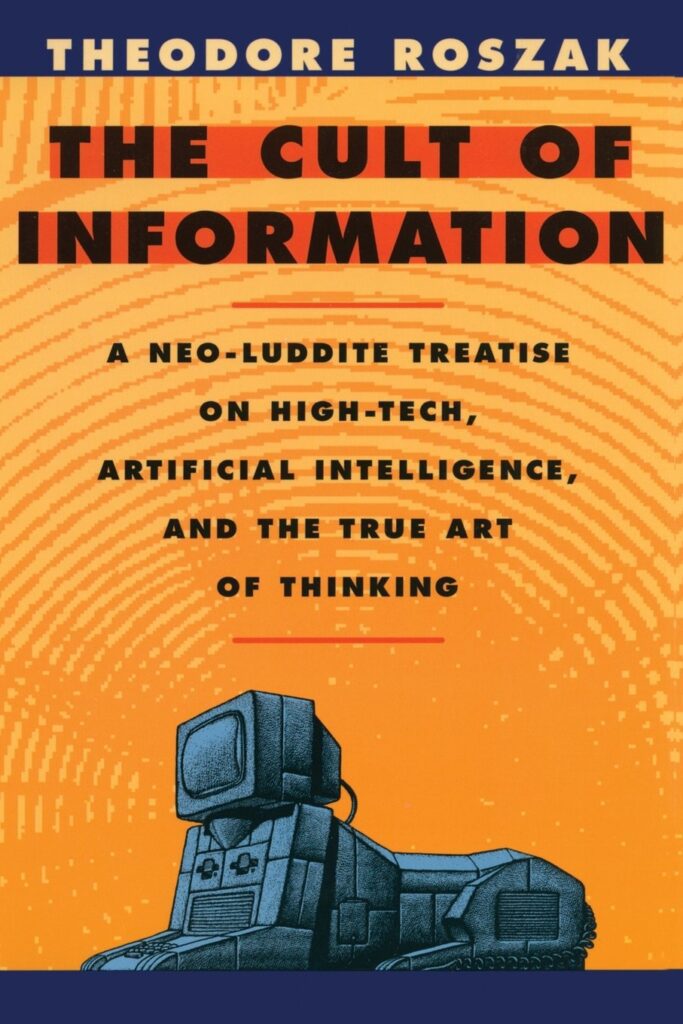Writer, Illustrator, Philosopher
“The Cult of Information” by Theodore Roszak

First published in 1986, and updated in 1993, Roszak’s book is now dated in a number of respects – a danger likely to befall any account of contemporary technology. And so, even with the updated edition, this makes some of it quaint and occasionally short-sighted. At the time of writing, there were no social media platforms, no smartphones, and the Internet had merely begun to hint at the way that it would connect people and change the way we live.
It’s a good thing then that the core value of the book – and what gives it enduring appeal and relevance – lies in its philosophical underpinning. The “cult of information” that Roszak identifies is one that still informs our present day attitudes to technology, and in fact seeing how deep the historical roots of it go can give us a new appreciation of the scale of the problem.
Roszak’s central thesis is that technological enthusiasts have – wittingly or otherwise – conflated information with knowledge. But information – bare listing of facts, collection of data – is not knowledge any more than the ingredients that make up a meal constitute sustenance. They must be combined, processed, internalised, broken down, digested – well, I’m sure you understand the process of eating! Until we perform a similar process on information, it can never become knowledge, can never become a useful and nourishing part of us. A key distinction that Roszak makes is therefore between information (data) and ideas. Ideas are what make sense of information, tell us which bits are relevant, how they relate to one another, and so on. So the idea that, by merely introducing it into our lives, a computer or a piece of software can furnish us with knowledge is ridiculous – and yet, as Roszak argues, this is exactly what purveyors of information technology would have us believe.
Much of the book tracks the spread of this cult through society – education, business, media, politics, the military, public services. The majority of this material is either still depressingly relevant, or with a twist may be updated for our current situation. For instance, in 1993 the British electrical grid was still reliant upon an antiquated computer that utilised a programming language that only a single person understood (and whose illness or unexpected demise would… it doesn’t bear thinking about). In 1993! And yet there still exist now modern systems that rely on obsolete technology and software (witness the 2017 Wannacry computer virus attack on the NHS that revealed how many of its computers were still running Windows XP…).
Another focus is upon the way in which the spread of computers has seen both the overestimation of the trajectory of computer evolution (which will soon outpace us), and a corresponding undervaling of human thinking (humans are merely machines – and not very good ones). But as Roszak points out, both these claims are in specific ways false. Despite the claims of techno-cultists and AI enthusiasts (which have been predicting superintelligent computers as just around the corner for almost as long as computers have existed), no machine as yet even approaches the level of general intelligence that even an infant possesses. So while there are specialist systems that can beat chess grandmasters, there yet exists no computer with enough “common sense” to get out of the rain (or perform any number of other equivalently simple tasks that we wouldn’t think twice about). People are not data processors – we are more than that – and we shouldn’t let the prodigous but narrow skills of AI make us forget that.
Datedness aside, there are a couple of places where Roszak overstates his case, or underestimates the potential for computing evolution, but on the whole his points remain insightful and sound. One minor point I would take issue with him on is his estimation of English philosopher Francis Bacon, whom Roszak sees as holding the view that problems can be solved simply by collecting enough data. I think this is not only unfair on Bacon, but false. Bacon did indeed advocate the widspread collection and comparision of experimental data and empirical observation, but it was with a view to improving our powers of induction – that facility of the mind (which Roszak praises) to identify patterns and draw general conclusions. Induction is what makes sense of data, but Bacon concluded that it needed training, for we were too prone to draw conclusions prematurely (a similar point to that made by Daniel Kahneman’s “Thinking, Fast and Slow” – which is also on my reading list). This aside, I mostly agree with Roszak’s views, and I think his diagnosis of utilitarianism as the quantity-obsessed belief system underpinning the cult of information is spot on.
The book is subtitled “A Neo-Luddite Treatise”, and makes the link between the orignal 18th century industrial vandals and the modern counter trend of technological scepticism. Ludditism has received a bad press – mostly from the descendants of the means-of-production-owning forces that won out in that industrial skirmish – as being anti-technology or anti-progress. But in fact Ludditism was concerned with the struggle to preserve human dignity and values in the face of dehumanising technological forces masquerading as “progress”. In this sense, it was anti-exploitation and anti-inequality – principles that a Tweeting, emailing, Instagramming Neo-Luddite can get behind without hypocrisy. (Well, OK, not Facebook. Nor Google, maybe. Nor Apple…)
Buy Book
Gareth Southwell is a philosopher, writer and illustrator from the UK. He is the author of the near-future sci-fi novel MUNKi, which concerns robots, the hunt for the Technological Singularity, and people swearing in Welsh.
Note: due to spam, comments have been disabled on this post, but you are welcome to contact the author to discuss further.